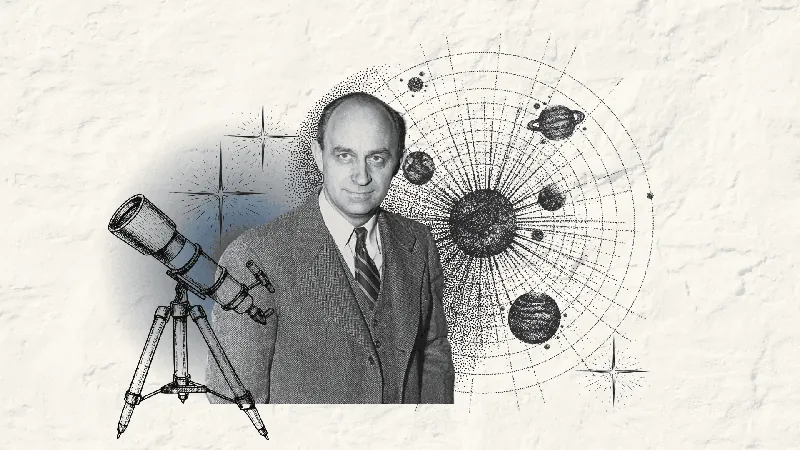
Are Aliens Ignoring Us? New Insights from Harvard's Astronomers
2025-06-10
Author: Sarah
The Age-Old Question of Extraterrestrial Life
In a casual lunchtime chat back in 1950, brilliant physicist Enrico Fermi posed a thought-provoking question that has echoed through the decades: "Where is everybody?" This inquiry stemmed from his wonder about the existence of intelligent life in the vast universe, amidst overwhelming statistical likelihood of its existence.
Fast Forward to Today: Closer to Answers?
Fast forward 75 years, and David Charbonneau, an astronomy professor at Harvard's Center for Astrophysics, believes we are on the brink of uncovering answers. Fermi’s paradox once loomed over us as a daunting enigma, especially when we had yet to discover any planets beyond our solar system. However, the groundbreaking discovery of the first exoplanet in 1995 opened up new avenues for exploration and understanding.
Breaking Down Fermi's Paradox
Charbonneau highlights that modern science allows us to tackle Fermi’s paradox step by step. Key questions have emerged: How many stars exist? Do they have planets? Are any of these planets Earth-like and potentially habitable? What’s the likelihood any life forms there? By unraveling these mysteries, we’ve made significant strides. Astonishingly, recent studies show that one in every four stars hosts an Earth-size rocky planet in a habitable zone.
Hunting for Life: The Habitable Worlds Observatory
Recognizing the urgent need to push our understanding further, the National Academies recommended the creation of the Habitable Worlds Observatory (HWO). This proposed space telescope is designed specifically to search for chemical signatures of life on over 25 potentially habitable planets. However, the status of this ambitious project remains uncertain.
The Odds of Extraterrestrial Life
The quest to understand the prevalence of life continues. Charbonneau poses the intriguing idea that with the right ingredients—water, oxygen, nitrogen, and phosphorus—life could emerge on a habitable planet given enough time. Yet, there’s no guarantee; if the first planet studied reveals no life, statistical possibilities widen, suggesting we might be looking at odds like one in a thousand or even a trillion.
A Broader Search for Extraterrestrial Encounters
Meanwhile, Avi Loeb, also from Harvard, advocates for an expanded approach in the search for extraterrestrial life. He spearheads the Galileo Project, which delves into unidentified aerial phenomena and objects from beyond our solar system. Named after the renowned astronomer who challenged Earth-centric views, Loeb emphasizes humility in our utmost assumptions about our uniqueness in the universe.
Challenging Norms: Oumuamua and Beyond
Loeb gained considerable attention when he speculated that 'Oumuamua, the first interstellar object detected crossing our solar system, might be an alien artifact. Despite facing skepticism, he insists on investigating anomalies before dismissing them. He compares Fermi’s idle speculation to someone lamenting loneliness without making an effort to connect.
A Slim Chance? The Alien Dilemma
For Charbonneau, the prospect of finding advanced extraterrestrial intelligence is not overly optimistic. Even if intelligent life were a whisper away at Proxima Centauri, communication would take years. The real kicker? Aliens might just not care about us, much like some intelligent Earth species choose not to develop technology or communicate.
The Fascinating Quest Continues
"Do we have a partner out there?" Loeb muses, encapsulating the enduring allure of this universal question. Whether or not we find neighbors in the cosmos, our journey to unravel these mysteries is only just beginning.



 Brasil (PT)
Brasil (PT)
 Canada (EN)
Canada (EN)
 Chile (ES)
Chile (ES)
 Česko (CS)
Česko (CS)
 대한민국 (KO)
대한민국 (KO)
 España (ES)
España (ES)
 France (FR)
France (FR)
 Hong Kong (EN)
Hong Kong (EN)
 Italia (IT)
Italia (IT)
 日本 (JA)
日本 (JA)
 Magyarország (HU)
Magyarország (HU)
 Norge (NO)
Norge (NO)
 Polska (PL)
Polska (PL)
 Schweiz (DE)
Schweiz (DE)
 Singapore (EN)
Singapore (EN)
 Sverige (SV)
Sverige (SV)
 Suomi (FI)
Suomi (FI)
 Türkiye (TR)
Türkiye (TR)
 الإمارات العربية المتحدة (AR)
الإمارات العربية المتحدة (AR)